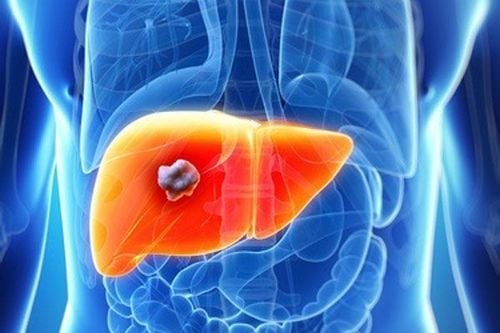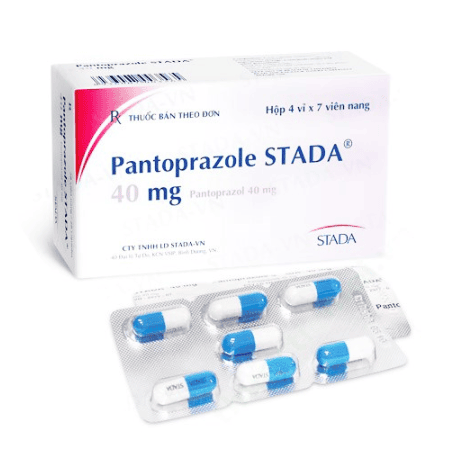This is an automatically translated article.
The article is professionally consulted by Master. Doctor Pham Thi Thu Huong - Head of Department of Gastroenterology - Endoscopy, Vinmec Times City International General Hospital.Gastroesophageal reflux disease (GERD) is a condition in which the contents of the stomach back up into the esophagus and throat, causing heartburn, belching and burning pain in the chest along the breastbone. Incidence is more and more common, especially in today's industrial life. What are the symptoms and how is it treated?
1. Harms of Gastroesophageal Reflux Disease Gastroesophageal reflux disease - esophagus not only causes heartburn and transient discomfort, but it also causes more dangerous harm than we think. In fact, the disease can lead to dangerous, even life-threatening complications if not treated properly. The following are the harmful effects of gastroesophageal reflux disease:
Inflammation of the respiratory tract Acid reflux from the stomach up to the respiratory tract can cause pharyngitis, rhinitis, bronchitis and pneumonia. As a result, patients cough, wheeze, hoarseness persist but do not respond to conventional treatment measures.
Esophageal ulcers Another harmful effect of acid reflux is esophageal stricture. Acid reflux damages the lining of the esophagus, causing inflammation, leading to ulcers and narrowing of the esophagus. The patient now presents with symptoms such as difficulty swallowing, choking, sore throat, chest pain, breastbone pain when eating, nausea and vomiting, loss of appetite.
Barrett's esophagus Gastroesophageal reflux disease can cause another type of esophagus damage called Barrett's esophagus. Severe and prolonged Barrett's esophagus can lead to esophageal cancer. This pathology was detected by esophagogastroduodenoscopy.
Esophageal cancer Esophageal cancer is a serious consequence of esophageal ulcers caused by prolonged reflux. The disease is common in people over the age of 50. Patients with early reflux esophageal cancer often have no atypical symptoms. In advanced stages, patients often go to the doctor with symptoms of choking, persistent pain behind the sternum, hoarseness. Occasionally, enlarged lymph nodes are palpable in the lower part of the throat. The patient's body was emaciated and exhausted due to inability to eat.
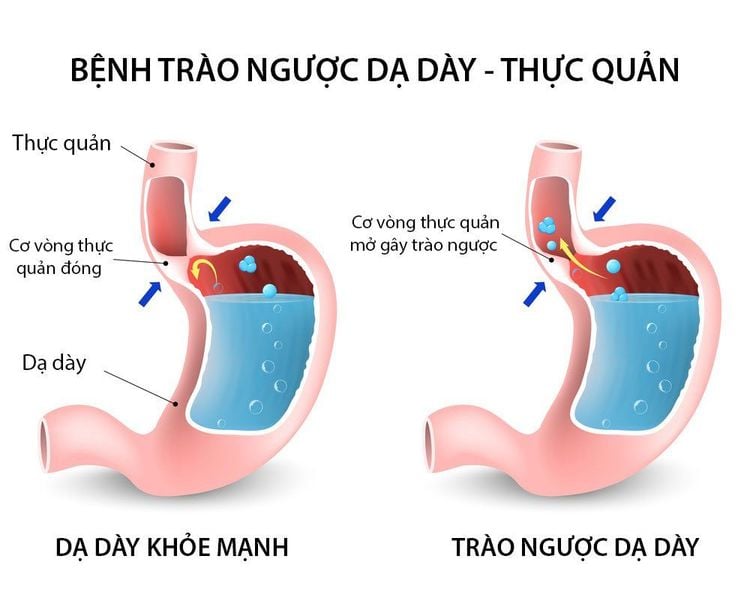
Trào ngược dạ dày thực quản có thể gây ra nhiều tác hại khôn lường
2. Treatment of gastroesophageal reflux disease The treatment of gastroesophageal reflux disease will depend on the severity of the disease. Most of the cases are mild, new, just need to change the lifestyle and diet, the disease can also be improved (quit smoking, quit drinking, lose weight, reduce stress...). However, it is better to see a doctor for advice, diagnosis and appropriate treatment to improve your condition if the disease persists. The main classes of drugs doctors commonly prescribe for patients with GERD are: PPIs that reduce stomach acid and some anti-reflux medications. Other methods can be applied with severe and prolonged acid reflux such as surgery: The specialist will advise you on the appropriate surgical method.
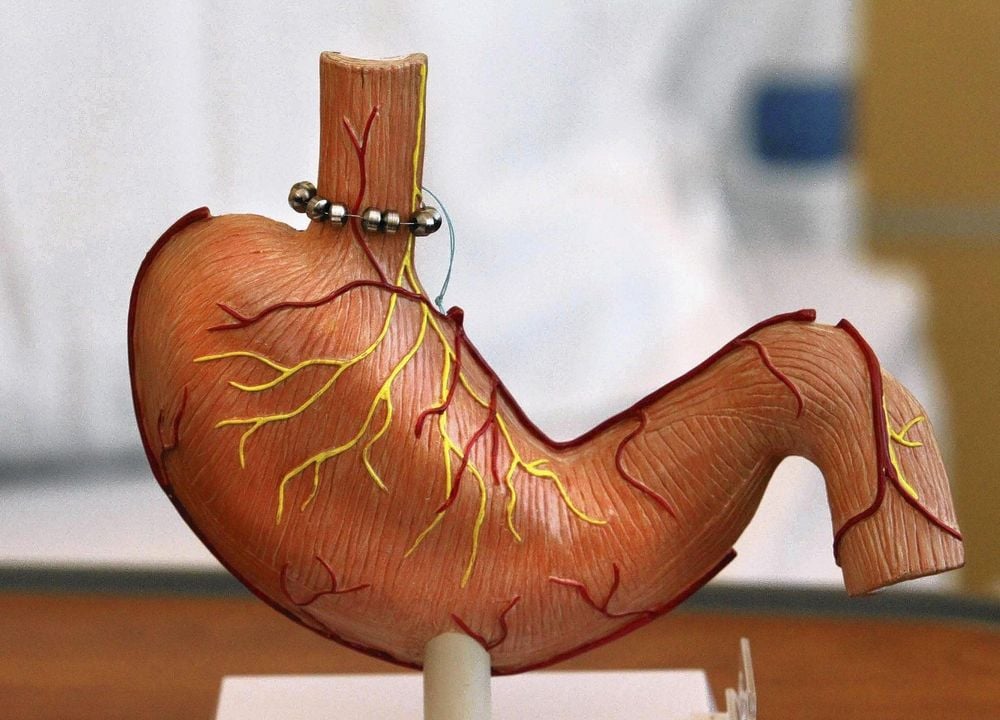
Việc điều trị trào ngược dạ dày thực quản sẽ tùy theo mức độ của bệnh
3. Home treatment with lifestyle changes Lifestyle changes can reduce the frequency of acid reflux. The treatment of gastroesophageal reflux must always be accompanied by a suitable diet and activities. Here are some acid reflux tips for you:
Maintain a healthy weight: Being overweight puts pressure on your entire body, causing your stomach to push up and making it easier for acid to flow. back up into the esophagus. Quit smoking: Smoking reduces the ability of the esophageal sphincter to work, leading to acid from the stomach backing up into the esophagus. Do not rush to lie down after eating: Do not eat dinner too late, preferably before 8pm. After eating 2-3, lie down or go to sleep. Eat slowly, chew thoroughly: Try to chew thoroughly and swallow all the food in your mouth before starting to take another serving. Eat small meals so that you do not eat too much, the food in the stomach is too full, it will easily flow up into the esophagus. Avoid foods and drinks that stimulate acid reflux: Fatty foods, fried foods, ketchup, alcohol, chocolate, mint, garlic, onions and caffeine. Add fruits and vegetables. Avoid wearing tight clothing: Clothes that are too tight will put pressure on the abdomen and lower esophageal sphincter, creating conditions that cause gastroesophageal reflux. Herbal Uses: Licorice and chamomile are sometimes used to relieve GERD. However, natural herbs sometimes have serious side effects and can interfere with medications being treated. Talk to your doctor before starting any herbal medicine. Relax, reduce stress: Evidence shows that reducing stress and reducing anxiety can clearly reduce symptoms of GERD.
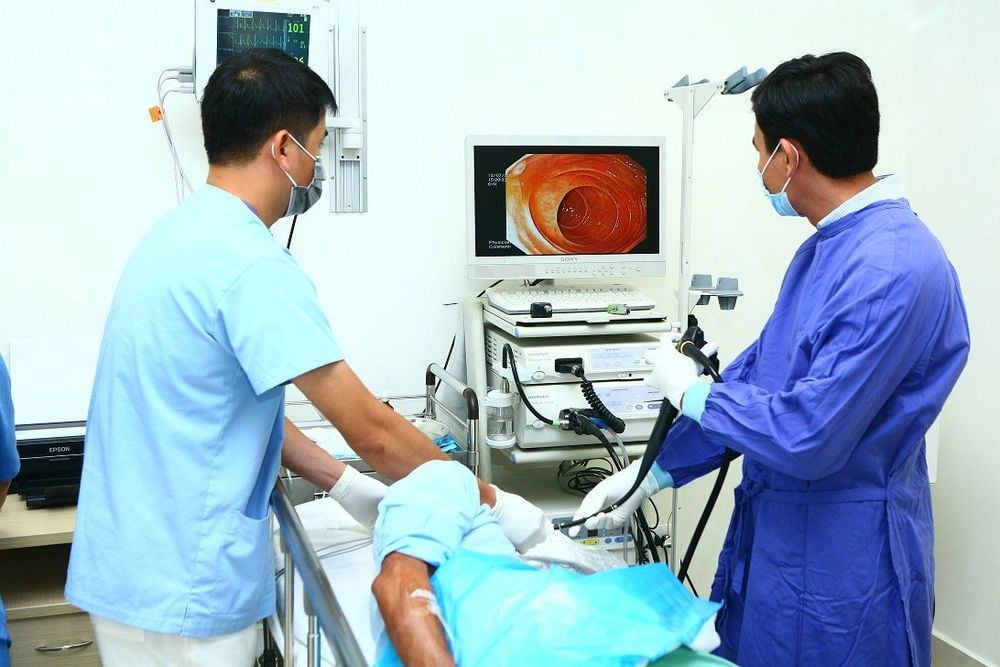
Bệnh nhân tại Bệnh viện Vinmec được thăm khám và điều trị với các bác sĩ chuyên khoa tiêu hóa hàng đầu cả nước
In case reflux disease makes you uncomfortable, does not go away for a long time or shows signs such as difficulty swallowing, choking, dull pain, you need to go to a gastroenterologist immediately for treatment intervention. timely.
Department of Endoscopy - Gastroenterology is one of the key specialties at Vinmec International General Hospital. For timely examination, advice and treatment of digestive diseases, you can contact Vinmec Health System nationwide or register online on the website for service.
Please dial HOTLINE for more information or register for an appointment HERE. Download MyVinmec app to make appointments faster and to manage your bookings easily.




